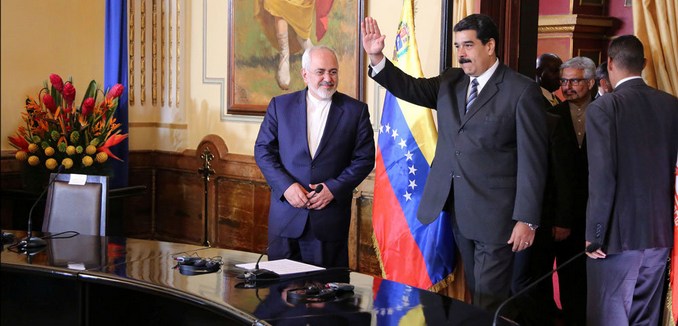The Iranian foreign minister’s visit to Latin America last week signaled the Islamic Republic’s intent to rebuild its missile program in the Western Hemisphere, Emanuele Ottolenghi, a senior fellow at the Foundation for Defense of Democracies, wrote in an analysis on Monday.
“Iran has long relied on Latin America to evade Western sanctions, including, critically, on ballistic missiles technology,” Ottolenghi noted. “Now sanctions are gone and Iran’s missile activity no longer banned, but Tehran continues to use America’s backyard to develop long-range missiles capable of carrying nuclear warheads.”
Zarif will be visiting with leaders in Cuba, Venezuela, Nicaragua, Bolivia, and Chile.
Earlier this month, a Brazilian journalist uncovered an official document from 2009 showing that then-Venezuelan President Hugo Chavez signed off on a $1.3 million investment for a joint venture between Venezuela’s state defense contractor and Iran’s Parchin Chemical Industries to produce components for solid rocket fuel. The document confirmed for the first time that Chavez approved joint military projects between the two nations, Ottolenghi wrote.
“The sum is trivial, but the timing and the partnerships are of critical importance,” he pointed out. Iran’s ballistic missile program and Parchin Chemical Industries were sanctioned by the United Nations in 2006, and Parchin was also sanctioned by the European Union and the United States in the following two years.
The unearthing of the 2009 agreement is thus important, Ottolenghi observed, because it’s “a reminder of the objectives that underlie Zarif’s Latin America charm campaign.” Having previously established relationships with anti-American regimes to escape sanctions in the past, Zarif returned to Latin America to take advantage of weaknesses in last year’s nuclear deal.
According to the nuclear deal, Parchin Chemicals will be removed from the EU’s sanctions list in seven years, while the UN restriction on Iran’s ballistic missile development has been downgraded to “a toothless call for Tehran to refrain from doing so,” Ottolenghi explained. Iran has also conduced multiple ballistic missile tests since last year, most recently in July.
“The infrastructure Iran established in Latin America to advance its missile program during the sanctions era will now make it easier for Tehran to further its program,” and its old allies will have the chance to cash in on the technology that Iran develops in the Western Hemisphere, Ottolenghi added.
“Prior to the nuclear deal, Iran relied on anti-American regimes like Venezuela, Cuba and Bolivia to withstand missile and nuclear sanctions,” Ottolenghi concluded. “Now, as the deal is implemented, Washington must not look away as the Islamic Republic revives its missile infrastructure in Latin America.”
Ben Cohen, senior editor of The Tower Magazine, wrote recently that in addition to strengthening alliances to further Iran’s missile program, Zarif was also likely using his Latin American trip to advance “the spread of terrorism and of terror-supporting ideologies.”
[Photo: Mehr News ]




